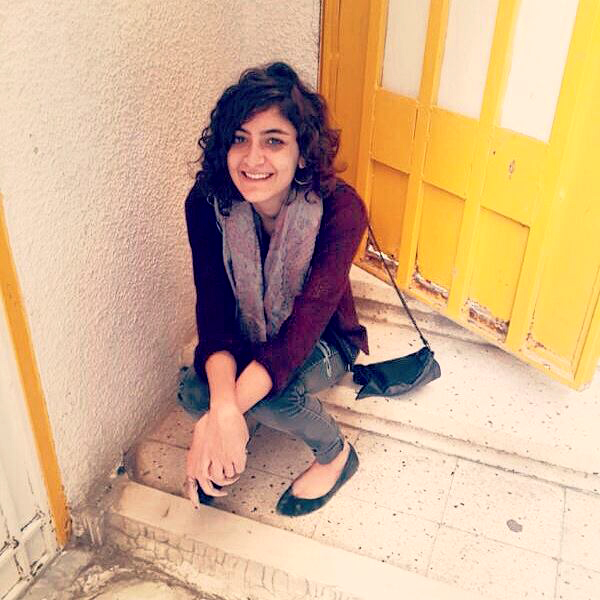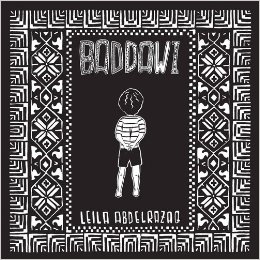Madison365 staff, Oct 30, 2015
 Palestinian American author Leila Abdelrazaq wrote the graphic novel Baddawi, which describes her father’s experience in a refugee camp during the Lebanese civil war.
Palestinian American author Leila Abdelrazaq wrote the graphic novel Baddawi, which describes her father’s experience in a refugee camp during the Lebanese civil war.
Leila Abdelrazaq, a Palestinian-American writer, cartoonist, and Palestinian rights activist, was a featured speaker Oct. 23 at Central Library for the Wisconsin Book Festival. The Madison Rafah Sister City Project co-hosted the event.
Abdelrazaq recently graduated from DePaul University where she double majored in Theatre Arts and Arabic Studies. She grew up in Chicago, where she was constantly reminded of the pro-Israeli sentiment here in the United States. As Abdelrazaq studied at DePaul University, she joined a chapter of the organization Students for Justice in Palestine (SJP). She also became a member of the National Students for Justice in Palestine Steering Committee. 
In order to more clearly voice her thoughts on the Israeli occupation of Palestine, Abdelrazaq started a blog where she could illustrate what the situation is like for people who are unaware of the suffering of the Palestinian people and the occupation of Palestinian land, in general.
What was different about this blog was that it consisted of comic strips Abdelrazaq personally designed. As her blog picked up more and more attention, a publisher contacted her and agreed to turn the series of comics into a full-length graphic novel, which she titled Baddawi.
Baddawi is the name of the refugee camp in Lebanon where Abdelrazaq’s father Ahmed and his family fled in order to escape the ethnic cleansing of Palestine. The book is the story of her father’s experience living as a child and young adult in that camp. Abdelrazaq uses graphic imagery to describe her father’s experience from the expulsion of her grandparents from Palestine in 1948 (following a massacre by Jewish militias), through their flight to Lebanon where they settled and where her father grew up. The book tells what it felt like to be a Palestinian boy in the midst of economic deprivation, anti-Palestinian discrimination in Lebanon, and frequent episodes of Israeli brutality. 
Abdelrazaq pointed out that in her book she never depicts the faces of the Israeli soldiers. Instead, she uses frightening silhouettes as a way to show that she is only the Palestinian perspective.
Abdelrazaq noted that fleeing to Lebanon didn’t mean freedom. In Lebanon, Palestinians were still treated poorly, and their history was carried with them wherever they went. Freedom and justice would only come with the liberation of Palestine.
“The Right of Return shouldn’t be a term just used for Israelis,” she said. “The Right of Return could also be applied to the rights Palestinians have to their land.”
Abdelrazaq’s father survived the wars and difficulties of life in Baddawi and was able to move to the United States for college and settle down here.
“Moving to the U.S. wasn’t a happy ending for my father either. He had to leave his family behind,” Abdelrazaq said. “Moving to the U.S. hasn’t brought justice to the Palestinian people. Only the right to live on what is Palestinian land will bring justice.”
Sadly, living in the U.S. is a frightening reminder to Abdelrazaq of Israel’s brutality toward the Palestinians. The U.S. gives billions of dollars in military aid to Israeli every year, as well as stocks of weapons.
In the book and during her presentation, Abdelrazaq described the Palestinian struggle against hopelessness. In response to a question from the audience about Palestinian resistance, Abdelrazaq described how hopelessness leads the Palestinians toward violent responses. The Palestinians often have little hope because two major world powers are against them, namely the U.S. and Israel. Palestinians who choose to resist and fight against Israel end up suffering severely and often face injury, death, or imprisonment.
Abdelrazaq explained that the U.S. and Israel ignore that most Palestinian resistance is non-violent, and use these relatively rare violent attacks as a way to justify the occupation and the ethnic cleansing. The occupation and repression are so brutal and persistent that many Americans forget how abused Palestinians are.
Abdelrazaq’s presentation ended with a book signing and sale. She isn’t currently planning another graphic novel, but is interested in getting more involved in the business of comic design.